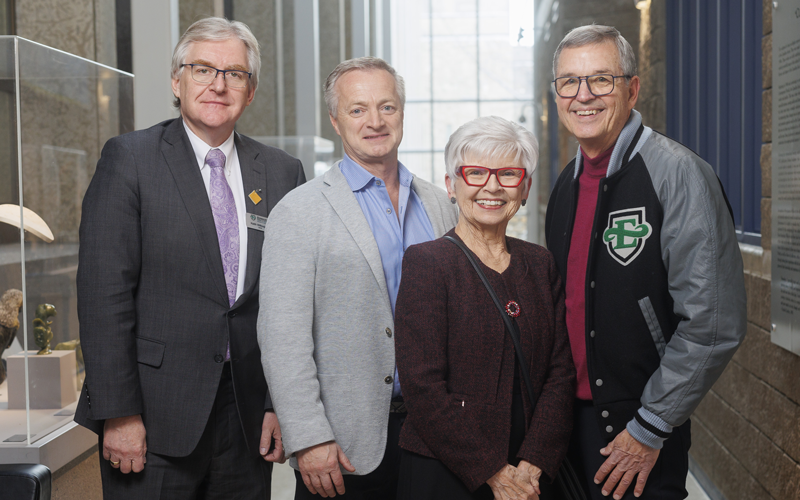
Greg Porter shares how he went from gears to garages at the 17th annual Haddock Entrepreneurial Speaker Series
Husband-and-wife duo, Gordon and Maureen Haddock started The Haddock Entrepreneurial Speaker Series (HESS) to expose Edwards School of Business students, faculty, staff, and the community to entrepreneurship. The 17th annual speaker, Greg Porter (BAC 1995) shared his entrepreneurial journey and the obstacles he overcame as he went from gears to garages. In his presentation, he shared the lessons he has learned from family business dynamics, employee management, and investment decisions.
Porter has achieved a successful career by improving employee management, increasing sales, and expanding his company globally. His achievements have been recognized by the Saskatchewan Business Excellence Award, Academy of Business Excellence Award, and the Best Managed Companies in Canada.
Porter grew up as a self-proclaimed “SOB”—son of the boss starting at the age of 2 years old when his father started a machine and gear shop known as Standard Machine. He followed in his father’s footsteps as he worked his way up from the production floor to shop foreman and eventually owner of Standard Machine. Despite only having a 30% chance of success in a second-generation business, Porter persevered and achieved his dream of owning and expanding a successful gear manufacturing company internationally.
To improve the company and mitigate the risks of failure, he took on the advice of a business coach who helped with second-generation businesses. His coach brought together his management team and asked them what Porter could do to become a better manager. Trusting and delegating power to his employees became an area of focus he felt he could improve.
In the beginning of his career, Porter mirrored his father’s management style. However, he learned that being involved with everything was not efficient if he wanted to grow the company. He needed to step down as a manager and become a leader. The first lesson he shared in the presentation were the principles that allowed him to trust his employees: responsibility, authority, and accountability.
Porter encouraged leaders alike in the audience to give managers the responsibility to manage their team, targets, and KPIs; allow respective employees the authority to make decisions in hiring, training, scheduling, and financial resource allocation; and to model accountability by meeting with staff to see how plans are progressing and what can be done to meet targets.
After Porter changed his management style, trust and communication within his company enhanced. Sales improved, staffing increased, and he was finally doing business internationally, with his company also ranking in the top 5 percentile for profit within the North American Gear Manufacturing Association.
While he succeeded in achieving his dreams, Porter knew that passing on the family business was going to be difficult. Knowing that the success rate for a third-generation business was only 15%, he decided that it would be in the best interest of his family to sell the company. After the sale of Standard Machine, he helped his children financially and strategically become their own entrepreneurs. With that in mind, the second lesson Porter encouraged the audience to consider is whether your family business should be passed on to create a family legacy or passed on to create family wealth.
Porter’s third lesson is to “stay in your lane—the one you’re really good at” when it comes to investment decisions. He recounted a time where he invested into an operating business, but later learned that being a minority partner had limited influence when it came to decisions. Porter says he will never again enter into an investment where he did not have control over the final say on decisions. He advised the audience that if you want to venture outside of the lane, be prepared to dedicate a lot of time learning about the product and your business partners. He acknowledged that he made the wrong investment decision at the time, but he did not let it define who he is.
Moving on from gears, Porter’s latest venture is in garages. In 2010, he purchased a small company and rebranded it to Autobox Garage Interiors with the aim to grow the company through franchising. Although franchising is moving outside his lane, Porter feels in control of the vision, strategy, and leadership of the Autobox franchise.
If you want to learn more about business topics, consider registering for COMM 101 offered by the Edwards School of Business. The course focuses on six business disciplines: Accounting, Finance, Human Resources, Management, Marketing, and Operations.
Watch Greg Porter’s presentation and the Get a Bigger Wagon Young Entrepreneur Awards here.
